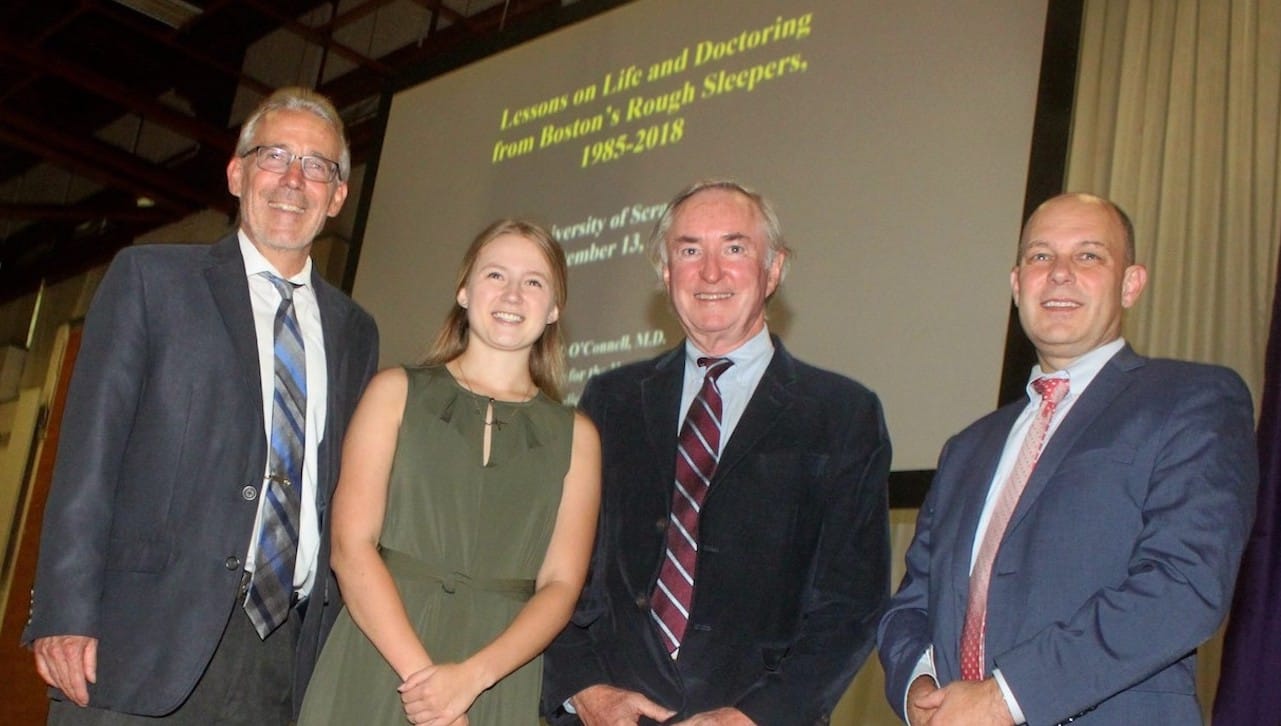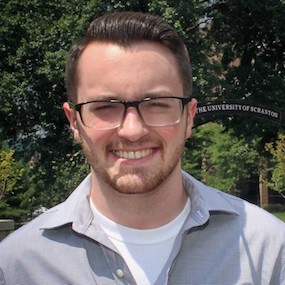Physician to the Homeless Speaks at Scranton

An author and professor of medicine at Harvard Medical school spoke about his work with the homeless at The University of Scranton’s Ignatian Values in Action Lecture.
James O’Connell M.D., is the founding physician of the Boston Healthcare for the Homeless Program and author of “Stories from the Shadows: Reflections of a Street Doctor.” The book follows his experiences taking care of the homeless on the streets in Boston, Massachusetts. He began his work with the homeless after transferring from an intensive care unit to a homeless shelter clinic in Boston.
“All I could do for two months was soak feet,” Dr. O’Connell said. “I was shocked because I went from ICU, high-tech, knowing the most complicated stuff I could imagine to two months of soaking feet.”
The nurses at the shelter clinic were teaching Dr. O’Connell how to specifically treat homeless people.
“What the nurses were trying to tell me was, look you’ve been trained all wrong, you know medicine, how to prescribe it and how to diagnose it but, you have no idea how to take care of a homeless person who is struggling to survive each day,” Dr. O’Connell said. “Those were challenges I had no idea how to overcome.”
The nurses had Dr. O’Connell start at the patient’s feet so they could get used to having him around.
“What the foot soak does is change the power structure,” Dr. O’Connell said. “As doctors, we end up with our faces in your face or listening to your heart and lungs, but we really invade personal space. That doesn’t work when you see someone whose really been scarred by bad experiences on the streets.”
Dr. O’Connell continued.
“The nurses really flipped that power structure and put you at the feet of the person and then way away from their personal space,” Dr. O’Connell said. “It was brilliant because you were out of their personal space and your doing something that is very comforting to them, and we did it night after night just so they can get used to the fact I was there.”
The feet soaking helping Dr. O’Connell take his first steps into learning how treat homeless people.
“It taught me a huge lesson and that’s that you have to slow down, you have to be present, you have to listen and you can’t offer ideas until you’ve heard everybody through,” Dr. O’Connell said.
Dr. O’Connell’s dedication to caring for the homeless grew even more and he reached out to people living on the streets.
“In Boston we have a shelter bed or matt for anyone that wants one,” Dr. O’Connell said. “There’s a really small core of homeless people that can’t handle the shelters and will stay outside all year long. They are a particular sub-group of the world’s population that I’ve grown to know really well, love dearly and feel very frustrated on what we should do for them.”
The book was part of the Royal Reads program through which first-year students read the book over the summer. During the fall semester, first-year students will attend first-year seminar classes where themes of the book will be discussed.
Dr. O’Connell next took his work from the exam room and applied it to his work on the streets by giving treatments to the homeless living on the street.
“When you start doing street medicine, you realize you have to break those rules and break out of those usual ways of thinking,” Dr. O’Connell said. “As we parsed it back, we found 80 or 90 percent of what gets done in an exam room could actually be done in a McDonald’s booth or on a bench near a train station.”
This thinking led to more medical work being done for the homeless on the streets, including giving flu shots.
“One week in the fall, we all just get out and give everybody who lives on the street a flu shot,” Dr. O’Connell said. “We started to see all sorts of possibilities for what you can do to take care of people who never come into the clinic or hospital.”
Dr. O’Connell then gave his take on how to combat homelessness.
“A solution to homelessness though is not simply good healthcare or good housing,” Dr. O’Connell said. “The solution, I think we have to understand comes from focusing on the poverty and trauma that causes it back when they were kids. So if we’re going to fix the problem we need to fix our schools, our welfare system, our work system, our justice system, our public health and mental health system, our agriculture, business and law.”
A book signing followed the lecture.







